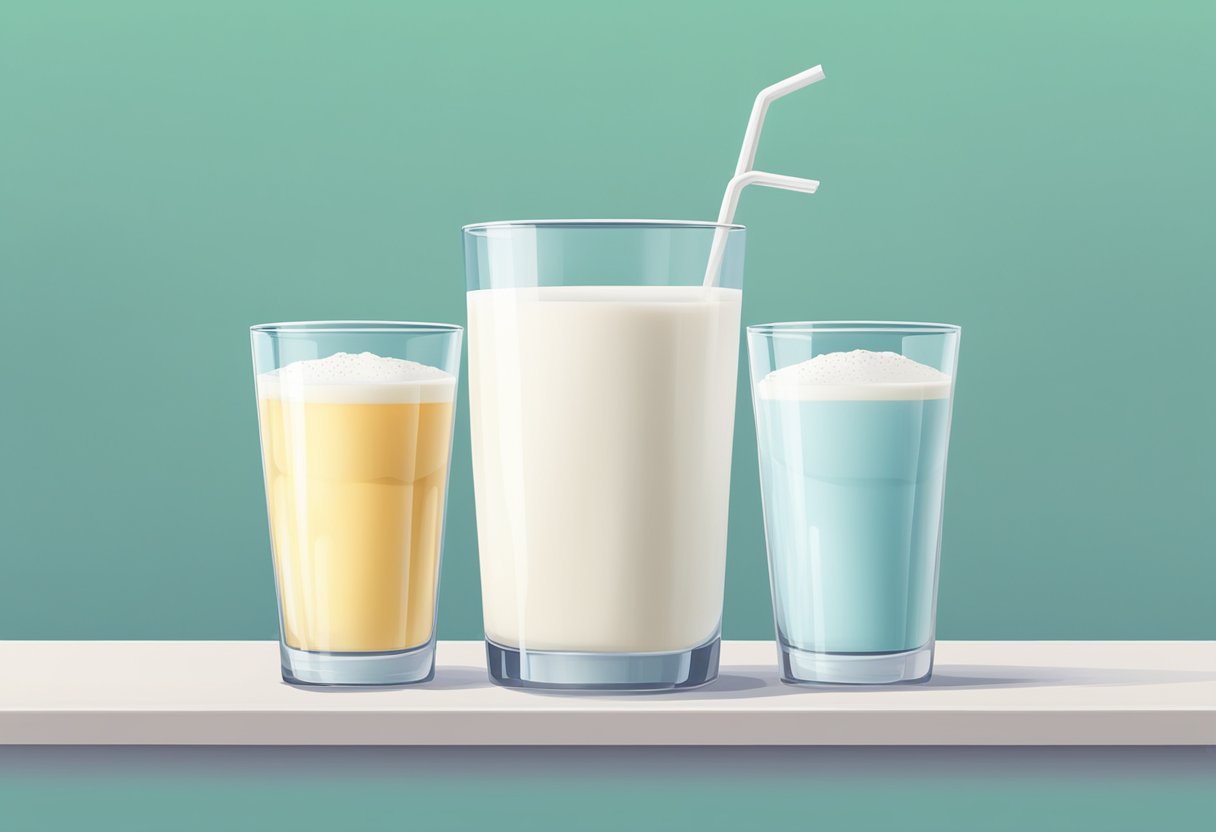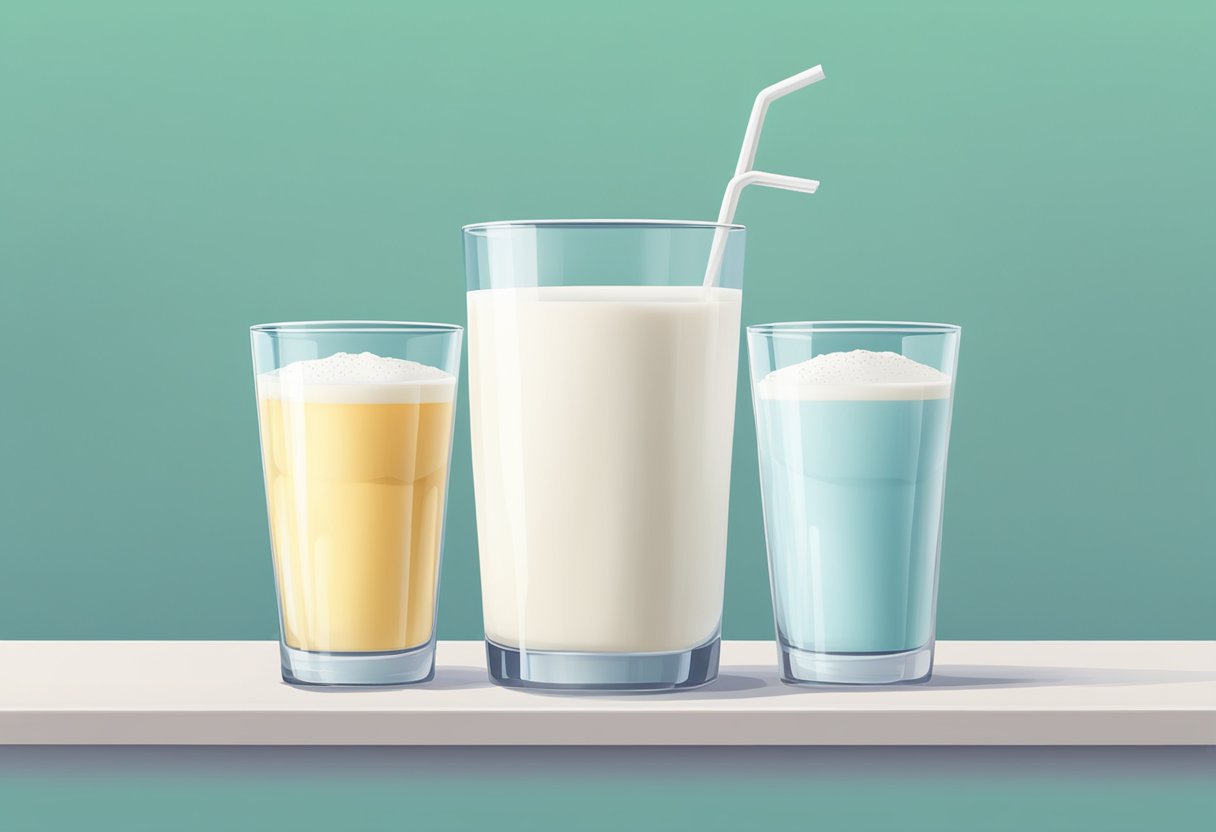Is Milk Keto Friendly? A Clear Answer for Your Diet

Milk is a staple in many households, but for those following a ketogenic diet, its place in their meal plan is up for debate. The ketogenic diet is a high-fat, low-carbohydrate diet that aims to put the body in a state of ketosis, where it burns fat for energy instead of glucose. As milk contains lactose, a type of sugar, it is often thought to be incompatible with the diet. However, there are varying opinions on whether milk can be included in a keto diet.
Some argue that milk should be avoided on a keto diet due to its high carbohydrate content. A cup of whole milk contains around 12 grams of carbohydrates, which is a significant portion of the daily allowance for those following the diet. However, others argue that milk can be consumed in moderation as long as it fits within the daily carbohydrate limit. Additionally, some types of milk, such as unsweetened almond milk or coconut milk, have lower carbohydrate content and may be more suitable for those following a keto diet.
What Is Keto Diet
The ketogenic diet, also known as the keto diet, is a low-carb, high-fat diet that has gained popularity in recent years. The goal of the keto diet is to put the body into a state of ketosis, where it burns fat for fuel instead of carbohydrates. This is achieved by drastically reducing carbohydrate intake and increasing fat intake.
When following the keto diet, individuals typically aim to consume around 70-80% of their daily calories from fat, 20-25% from protein, and 5-10% from carbohydrates. This is in contrast to a typical Western diet, which is high in carbohydrates and low in fat.
The keto diet has been shown to be effective for weight loss, as well as for improving certain health conditions such as type 2 diabetes and epilepsy. However, it is important to note that the keto diet is not suitable for everyone, and should be approached with caution.
Overall, the keto diet is a high-fat, low-carb diet that aims to put the body into a state of ketosis. It has been shown to be effective for weight loss and improving certain health conditions, but should be approached with caution and under the guidance of a healthcare professional.
Understanding the Role of Milk in Keto Diet
https://www.youtube.com/watch?v=UBmiDuPrUnE&embed=true
Milk is a popular beverage that is consumed by people all over the world. However, when it comes to the keto diet, there are mixed opinions about whether milk is keto-friendly or not. In this section, we will explore the role of milk in the keto diet.
Carbs in Milk
Milk contains lactose, which is a type of sugar. This means that milk contains carbohydrates. The amount of carbs in milk varies depending on the type of milk. For example, whole milk contains more carbs than skim milk. It is important to note that the carbs in milk are not all created equal. Some of the carbs in milk are fiber, which does not affect blood sugar levels. The net carbs in milk are the total carbs minus the fiber.
Fat and Protein in Milk
Milk is a good source of both fat and protein. The amount of fat and protein in milk varies depending on the type of milk. For example, whole milk contains more fat than skim milk. Milk also contains a variety of vitamins and minerals, including calcium.
Keto Milk
There are some types of milk that are considered more keto-friendly than others. For example, almond milk and coconut milk are lower in carbs than cow’s milk. However, it is important to read the labels carefully, as some types of almond milk and coconut milk may contain added sugars.
Lactose Intolerance
Some people are lactose intolerant, which means that they cannot digest lactose. This can cause digestive problems such as bloating, gas, and diarrhea. For people who are lactose intolerant, there are lactose-free milk options available.
Conclusion
In conclusion, milk can be a part of a keto diet, but it is important to choose the right type of milk and to consume it in moderation. Almond milk and coconut milk are good options for people who want to limit their carb intake. However, it is important to read the labels carefully and to choose unsweetened varieties. For people who are lactose intolerant, there are lactose-free milk options available.
Types of Milk and Their Keto-Friendliness
https://www.youtube.com/watch?v=s6TXDFp1EcM&embed=true
When considering whether milk is keto-friendly, it’s important to look at the macronutrient content of each type of milk. Here are some of the most common types of milk and their keto-friendliness:
Whole Milk
Whole milk is not considered keto-friendly due to its high carbohydrate content. One cup of whole milk contains 12 grams of carbs, which is too high for most people following a ketogenic diet.
Almond Milk
Almond milk is a popular low-carb, plant-based milk alternative. Unsweetened vanilla almond milk typically contains only 1 gram of net carbs per cup, making it a great option for those following a keto diet.
Coconut Milk
Canned coconut milk is high in fat and low in carbs, making it a great option for those following a keto diet. One cup of canned coconut milk contains 12 grams of fat and only 3 grams of carbs.
Cashew Milk
Cashew milk is another plant-based milk alternative that is low in carbs. One cup of unsweetened cashew milk contains only 1 gram of net carbs, making it a great option for those following a keto diet.
Soy Milk
Soy milk is a controversial choice for those following a keto diet due to its high protein and carb content. One cup of soy milk contains 7 grams of protein and 4 grams of carbs, as well as phytoestrogens that may affect hormone levels in some individuals.
Other Milk Alternatives
There are many other milk alternatives available, including oat milk, rice milk, flax milk, macadamia nut milk, hemp milk, pea milk, pistachio milk, and walnut milk. While some of these options may be low in carbs, it’s important to check the nutrition label and ingredient list to ensure they fit within your keto diet plan.
Understanding Net Carbs in Milk
When considering whether milk is keto-friendly, it’s important to understand the concept of net carbs. Net carbs are the total amount of carbohydrates in a food minus the amount of fiber it contains. This is because fiber is not digested by the body and does not contribute to blood sugar levels.
Milk contains both carbs and sugar, which can make it a tricky choice for those following a keto diet. A single cup of whole milk contains around 12 grams of carbohydrates, of which 12 grams are sugar. This can quickly add up and exceed the daily carb limit for those following a strict keto diet.
However, there are lower carb options available. For example, unsweetened almond milk contains only 1 gram of net carbs per cup, making it a more keto-friendly choice. Other low-carb milk alternatives include coconut milk and hemp milk.
It’s also important to check the label for added sugars. Some flavored milk products, such as chocolate milk, can contain a significant amount of added sugar. This can increase the carb count and make it unsuitable for a keto diet.
In summary, while milk can be high in carbs and sugar, there are lower carb alternatives available. By checking the label for net carbs and added sugars, those following a keto diet can make informed choices about whether milk fits into their daily carb limit.
The Role of Dairy Products in a Keto Diet

Dairy products are a popular source of fat and protein for those following a keto diet. However, not all dairy products are created equal when it comes to their keto-friendliness.
Cheese, butter, heavy cream, and half-and-half are all high-fat dairy products that are commonly consumed on a keto diet. These products are low in carbohydrates and can help increase fat intake, which is important for achieving ketosis. However, it is important to be mindful of portion sizes, as these products are high in calories.
Yogurt can also be a part of a keto diet, but it is important to choose a low-carb option. Greek yogurt is a good choice, as it is higher in protein and lower in carbohydrates than regular yogurt. Skim milk and skim cream are not recommended on a keto diet, as they are high in carbohydrates and low in fat.
Overall, dairy products can be a valuable addition to a keto diet, but it is important to choose high-fat, low-carb options and be mindful of portion sizes.
Coffee Creamers and Keto Diet

Coffee is a popular beverage that is consumed worldwide. It is a low-calorie drink that can be enjoyed on a keto diet. However, the way you drink your coffee can make a difference.
Butter coffee, also known as bulletproof coffee, is a popular keto-friendly coffee. It is made by blending coffee with butter and MCT oil. This drink is high in fat and low in carbohydrates, making it an ideal choice for those following a keto diet.
Coffee creamers, on the other hand, can be high in carbohydrates and sugar. It is important to choose a keto-friendly creamer that is low in carbs. Heavy cream is a great option for those following a keto diet. It is high in fat and low in carbs, making it a perfect addition to your coffee.
In conclusion, coffee can be enjoyed on a keto diet as long as it is consumed in moderation and with keto-friendly ingredients. Butter coffee and heavy cream are great options for those following a keto diet. It is important to avoid high-carb coffee creamers to stay in ketosis.
Sweetened vs Unsweetened Milk

When it comes to milk, there are two main types: sweetened and unsweetened. Sweetened milk contains added sugar, while unsweetened milk does not.
For those following a keto diet, unsweetened milk is the better option. This is because sugar is a carbohydrate, and consuming too many carbs can kick you out of ketosis.
It’s important to note that even unsweetened milk still contains natural sugars, such as lactose. However, these sugars are present in much smaller amounts than added sugars found in sweetened milk.
When choosing unsweetened milk, it’s important to check the label to ensure that no sugar has been added. Some brands of unsweetened milk may still contain added sugars or other sweeteners.
Overall, if you’re following a keto diet, it’s best to stick with unsweetened milk to avoid consuming too many carbs.
Milk Substitutes for Keto Diet
For those following a keto diet, regular milk may not be the best option due to its high carbohydrate content. However, there are several milk substitutes that can be used in its place.
One popular option is almond milk, which is low in carbs and high in healthy fats. It is also a good source of vitamin E and magnesium. Another option is coconut milk, which is also low in carbs and high in healthy fats. Coconut milk is rich in medium-chain triglycerides (MCTs), which are easily converted into ketones by the liver.
Other non-dairy milk alternatives that are keto-friendly include soy milk, hemp milk, and flax milk. These options are low in carbs and high in protein and healthy fats. It is important to note that soy milk may not be suitable for those with soy allergies or sensitivities.
For those who still prefer dairy, there are low carb milk alternatives available. These include lactose-free milk, which is made by adding lactase to regular milk to break down the lactose sugar. Another option is heavy cream, which is high in fat and low in carbs. It can be used in place of milk in recipes or added to coffee or tea.
Overall, there are many keto-friendly milk substitutes available for those looking to reduce their carbohydrate intake. It is important to choose options that fit within your dietary restrictions and preferences.
Milk to Avoid on Keto
When following a keto diet, it is essential to limit your carbohydrate intake to achieve and maintain ketosis. Some types of milk can be high in carbohydrates, making them unsuitable for the keto diet. Here are some types of milk to avoid on keto:
Sweetened Milks
Sweetened milks, such as flavored milk and sweetened condensed milk, are high in sugar and carbohydrates. They can contain up to 20 grams of carbohydrates per serving, making them unsuitable for the keto diet.
Condensed Milk
Condensed milk is a thick, sweet milk that is commonly used in desserts. It is high in sugar and carbohydrates, with up to 22 grams of carbohydrates per serving. It should be avoided on the keto diet.
Chocolate Milk
Chocolate milk is a sweetened milk that is flavored with chocolate syrup or powder. It is high in sugar and carbohydrates, with up to 24 grams of carbohydrates per serving. It should be avoided on the keto diet.
Milks to Avoid
In addition to sweetened milks, some types of milk are naturally high in carbohydrates and should be avoided on the keto diet. These include:
- Regular cow’s milk
- Soy milk
- Rice milk
- Oat milk
- Almond milk (sweetened)
While unsweetened almond milk is a popular choice on the keto diet, sweetened almond milk can contain up to 12 grams of carbohydrates per serving, making it unsuitable for the diet.
In summary, if you are following the keto diet, it is important to avoid sweetened milks, condensed milk, chocolate milk, and certain types of milk that are naturally high in carbohydrates. Instead, opt for unsweetened almond milk, coconut milk, or other low-carbohydrate milk alternatives.
Keto Friendly Foods

When following a keto diet, it is important to consume foods that are low in carbohydrates and high in healthy fats. Here are some delicious and healthy keto-friendly foods that can be incorporated into any meal plan:
- Veggies: Leafy greens, broccoli, cauliflower, zucchini, and asparagus are all great keto-friendly vegetables that are low in carbs and high in fiber. They can be roasted, sautéed, or eaten raw as a salad.
- Keto Cereal: There are many keto-friendly cereal options available that are low in carbs and high in healthy fats. Some popular options include granola made with nuts and seeds, chia seed pudding, and coconut yogurt.
- Organic: When possible, it is best to choose organic foods on a keto diet. Organic meats, dairy, and produce are free from harmful chemicals and pesticides that can disrupt hormone balance and cause inflammation.
In summary, incorporating keto-friendly foods into a meal plan can help support weight loss, improve energy levels, and promote overall health. By choosing low-carb, high-fat options like veggies, keto cereal, and organic foods, individuals can enjoy delicious and nutritious meals while staying in ketosis.








Leave a Reply